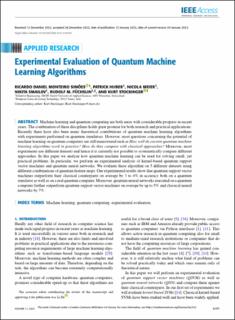Please use this identifier to cite or link to this item:
https://doi.org/10.21256/zhaw-26784| Publication type: | Article in scientific journal |
| Type of review: | Peer review (publication) |
| Title: | Experimental evaluation of quantum machine learning algorithms |
| Authors: | Monteiro Simoes, Ricardo Daniel Huber, Patrick Meier, Nicola Smailov, Nikita Füchslin, Rudolf M. Stockinger, Kurt |
| et. al: | No |
| DOI: | 10.1109/ACCESS.2023.3236409 10.21256/zhaw-26784 |
| Published in: | IEEE Access |
| Volume(Issue): | 11 |
| Page(s): | 6197 |
| Pages to: | 6208 |
| Issue Date: | Jan-2023 |
| Publisher / Ed. Institution: | IEEE |
| ISSN: | 2169-3536 |
| Language: | English |
| Subjects: | Quantum computing; Machine learning; Neural network |
| Subject (DDC): | 006: Special computer methods |
| Abstract: | Machine learning and quantum computing are both areas with considerable progress in recent years. The combination of these disciplines holds great promise for both research and practical applications. Recently there have also been many theoretical contributions of quantum machine learning algorithms with experiments performed on quantum simulators. However, most questions concerning the potential of machine learning on quantum computers are still unanswered such as How well do current quantum machine learning algorithms work in practice? How do they compare with classical approaches? Moreover, most experiments use different datasets and hence it is currently not possible to systematically compare different approaches. In this paper we analyze how quantum machine learning can be used for solving small, yet practical problems. In particular, we perform an experimental analysis of kernel-based quantum support vector machines and quantum neural networks. We evaluate these algorithm on 5 different datasets using different combinations of quantum feature maps. Our experimental results show that quantum support vector machines outperform their classical counterparts on average by 3 to 4% in accuracy both on a quantum simulator as well as on a real quantum computer. Moreover, quantum neural networks executed on a quantum computer further outperform quantum support vector machines on average by up to 5% and classical neural networks by 7%. |
| URI: | https://digitalcollection.zhaw.ch/handle/11475/26784 |
| Fulltext version: | Published version |
| License (according to publishing contract): | CC BY 4.0: Attribution 4.0 International |
| Departement: | School of Engineering |
| Organisational Unit: | Institute of Computer Science (InIT) Institute of Applied Mathematics and Physics (IAMP) |
| Appears in collections: | Publikationen School of Engineering |
Files in This Item:
| File | Description | Size | Format | |
|---|---|---|---|---|
| 2023_MonteiroSimoes-etal_Experimental-evaluation-of-quantum-machine-learning-algorithms.pdf | 2.12 MB | Adobe PDF |  View/Open |
Show full item record
Monteiro Simoes, R. D., Huber, P., Meier, N., Smailov, N., Füchslin, R. M., & Stockinger, K. (2023). Experimental evaluation of quantum machine learning algorithms. IEEE Access, 11, 6197–6208. https://doi.org/10.1109/ACCESS.2023.3236409
Monteiro Simoes, R.D. et al. (2023) ‘Experimental evaluation of quantum machine learning algorithms’, IEEE Access, 11, pp. 6197–6208. Available at: https://doi.org/10.1109/ACCESS.2023.3236409.
R. D. Monteiro Simoes, P. Huber, N. Meier, N. Smailov, R. M. Füchslin, and K. Stockinger, “Experimental evaluation of quantum machine learning algorithms,” IEEE Access, vol. 11, pp. 6197–6208, Jan. 2023, doi: 10.1109/ACCESS.2023.3236409.
MONTEIRO SIMOES, Ricardo Daniel, Patrick HUBER, Nicola MEIER, Nikita SMAILOV, Rudolf M. FÜCHSLIN und Kurt STOCKINGER, 2023. Experimental evaluation of quantum machine learning algorithms. IEEE Access. Januar 2023. Bd. 11, S. 6197–6208. DOI 10.1109/ACCESS.2023.3236409
Monteiro Simoes, Ricardo Daniel, Patrick Huber, Nicola Meier, Nikita Smailov, Rudolf M. Füchslin, and Kurt Stockinger. 2023. “Experimental Evaluation of Quantum Machine Learning Algorithms.” IEEE Access 11 (January): 6197–6208. https://doi.org/10.1109/ACCESS.2023.3236409.
Monteiro Simoes, Ricardo Daniel, et al. “Experimental Evaluation of Quantum Machine Learning Algorithms.” IEEE Access, vol. 11, Jan. 2023, pp. 6197–208, https://doi.org/10.1109/ACCESS.2023.3236409.
Items in DSpace are protected by copyright, with all rights reserved, unless otherwise indicated.